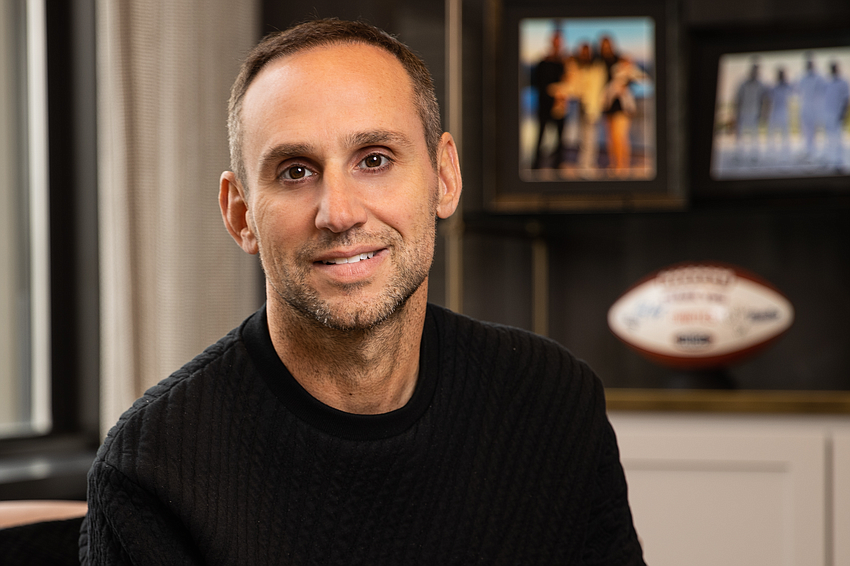
As Fanatics Inc. expands its sports products empire, the company has been a target of critics over the years.
However, CEO Michael Rubin thinks Fanatics is taking too much blame for the latest issue: new uniforms made by the company, which raised the ire of Major League Baseball players.
“We’re purely doing exactly as we’ve been told, and we’ve been told we’re doing everything exactly right,” Rubin said March 1 at the MIT Sloan Sports Analytics Conference, according to a report by The Associated Press.
Ridicule of the uniforms has been a hot topic since spring training began in mid-February, and Rubin’s comments at the MIT conference were his first public response.

Fanatics has been manufacturing baseball uniforms since acquiring a company called Licensed Sports Group in 2017. But the uniforms were designed by Nike, and Fanatics is producing them under contract to Nike.
“Nike designs everything. Hands us a spec and says, ‘Make this,’” Rubin said at the conference, according to AP.
“We have made everything exactly to the spec.”
Major league players have expressed unhappiness with several design issues but the biggest headlines were generated by photos of uniform pants with see-through fabric that could show players’ underwear.
Rubin said at the conference that the criticism has not been fun, but he expects the controversy to die down.
“I believe Nike will be proved right,” he said.
Fanatics was founded with a single store in the Orange Park Mall in 1995.
It began growing an online sports merchandising business and founders Mitchell and Alan Trager sold the Jacksonville-based business in 2011 to a Philadelphia company run by Rubin.
Fanatics maintains its commerce headquarters in Jacksonville but the corporate offices are in New York.
After The Fortegra Group Inc. withdrew plans for an initial public offering in 2021, parent company Tiptree Inc. repeatedly said it would eventually try again.
Fortegra’s second attempt at an IPO was withdrawn Feb. 7, a day before the Jacksonville-based specialty insurance company was supposed to hit the market.
But as Tiptree held its year-end conference call Feb. 29, company officials did not say anything about a future attempt at an IPO.
“Although the recent market environment has been unconducive for a public offering, we firmly believe Fortegra is strategically well positioned to maintain the trajectory of consistent growth and sustained underwriting profitability over the long term,” Executive Chairman Michael Barnes said.
Fortegra is the largest holding of Connecticut-based investment company Tiptree.
Tiptree said Fortegra’s revenue rose 25.4% in the fourth quarter to $433.2 million and rose 27.6% to $1.59 billion for all of 2023.
Fortegra’s adjusted net income rose 38% last year to $115.7 million.
Rayonier Advanced Materials Inc., or RYAM, reported a loss from continuing operations for the fifth straight year.
The Jacksonville-based maker of cellulose specialties reported a 2023 loss of $102 million, or $1.57 a share.
Sales fell 4.3% to $1.64 billion for the full year, with fourth-quarter sales dropping 15.6% to $422 million.
“The fourth quarter shortfall can be attributed to weaker-than-expected demand for paperboard, while the full year results were impacted by persistent weak demand across various product categories, notwithstanding the strong pricing observed in our CS segment,” CEO De Lyle Bloomquist said in RYAM’s Feb. 28 conference call.
“Despite the challenges stemming from the weak paperboard results in Q4, I was encouraged by the rebound observed in our core cellulose specialty business. This was principally the result of increased market share recurring to us as a result of the closure of a competitor,” he said.
The competitor was Atlanta-based Georgia-Pacific, which closed its cellulose products mill in Perry, near Tallahassee, in November.
As it looks to return to profitability, RYAM announced in October it was putting its paperboard and high-yield pulp business made at a Canadian plant up for sale.
RYAM intends to use proceeds from a sale to pay down debt.
“We received expressions of interest from both strategic parties and financial sponsors, and we’ll provide further updates on this project as it develops,” Bloomquist said in the conference call.
Publix Super Markets Inc. reported a slight increase in its stock price after fourth-quarter earnings fell slightly, due to an extra week in the fourth quarter of 2022.
The Lakeland-based supermarket chain said adjusted earnings of 32 cents a share were 7 cents lower than the previous year.
Sales in the fourth quarter fell 4% to $14.7 billion but excluding the additional week in 2022, sales would have increased 2.8%, it said.
Publix’s total sales in 2023 rose 4.7% to $57.1 billion and sales at stores open for more than one year rose 4.2%.
Publix said that based on its latest appraisal, its stock price increased from $15.10 at the end of 2023 to $15.20 as of March 1.
The company’s stock is made available for sale only to employees and its price is determined by an appraisal five times a year
Treace Medical Concepts Inc. said 2023 revenue grew 32% to $187.1 million, as the Ponte Vedra-based company expands its product line.
Treace Medical was formed a decade ago to market a surgical procedure to treat bunions, but the company is growing with products to treat additional foot and ankle issues.
“As a uniquely focused foot and ankle company, we believe we’re distinctly positioned to drive innovation-led growth and deliver long-term shareholder value,” CEO John Treace said in a Feb. 27 conference call, according to a company transcript.
“We have 10 new innovation launches slated for 2024 and more in our R&D pipeline to ensure a steady cadence of new innovations in 2025 and beyond,” he said.
Treace Medical reported a 2023 net loss of $49.5 million and is projected by analysts to continue losing money for at least the next two years.
However, the company expects revenue to grow to $220 million to $225 million in 2024, a growth rate of 18% to 20%.
J.P. Morgan analyst Robbie Marcus said in a research note that was lower than the company’s forecast of at least 20% growth made at a recent J.P. Morgan conference.
“While a touch lower than expected, we believe this reflects management conservatism following an uneven performance in 2H23 rather than a lack of confidence in ultimately reaching 20% plus,” he said.
Despite high mortgage rates dampening the housing market, Jacksonville-based Dream Finders Homes Inc. reported higher closings and sales prices in 2023.
Fourth-quarter earnings rose 18% to $102 million, or $1 per share, with homebuilding revenue rising 3% to $1.1 billion.
For all of 2023, revenue rose 12% to $3.7 billion, with the number of home closings rising 6% to 7,314.
Dream Finders said its average sale price of homes closed increased 7% to $505,764.
“Given the depth of industry uncertainty going into 2023, we were pleased to achieve another year of positive growth for our business,” CEO Patrick Zalupski said in a Feb. 29 news release.
The company does not hold quarterly conference calls to discuss earnings.
Dream Finders has expanded since the end of 2023 with the acquisition of Charleston, South Carolina-based Crescent Homes, which has additional operations in Greenville, South Carolina, and Nashville, Tennessee.
“This acquisition added three new markets, increasing our footprint to an aggregate of 20 markets, and should provide meaningful future closing and earnings volume,” Zalupski said.
Goldman Sachs analyst Will Nance reinstated the firm’s coverage of Fidelity National Information Services Inc., or FIS, with a “buy” rating after the sell-off of a majority stake in its merchant payments unit.
“Following the divestiture of a controlling stake in Worldpay, we believe FIS should be poised to deliver on a much more steady and predictable growth algorithm with less cyclicality and greater visibility,” Nance said in his Feb. 29 research report.
With FIS focusing on providing technology for the financial services industry, Nance projects annual revenue growth by a low-to-mid-single-digit percentage. However, that growth could skew upward in the next few years, he said.
He also sees potential for earnings growth as FIS cuts costs.
“While we expect significantly less variability in top-line performance, in the near term we expect continued benefits from the full run rate of savings from the company’s enterprise savings initiative,” he said
Nance set a price target of $84 for the stock, which was trading at $66.87 at the time of his report.
“After several years of restructuring, industry headwinds to both the legacy merchant business and non-recurring headwinds in banking, we expect the coming years to deliver much cleaner and more defensive earnings trends, which we expect should support a re-rating to a mid-teens-plus earnings multiple over time,” he said.
Moody’s upgrades Regency rating
Moody’s Investor Service announced Feb. 27 it upgraded its credit ratings on Regency Centers L.P. from “Baa1” to “A3.”
Regency Centers L.P. is a subsidiary of Jacksonville-based shopping center developer Regency Centers Corp., which conducts substantially all of its operations.
“The upgrades reflect the REIT’s consistently strong operating performance such as lease rate and rent per square foot, high-quality and diversified portfolio of grocery-anchored shopping centers, prudent capital strategy, and good liquidity profile,” Moody’s said in a news release.
Moody’s said Regency’s outlook is stable.
“The stable outlook reflects Moody’s expectation that the REIT’s portfolio performance and financial metrics will remain strong despite the slowing macroeconomic environment,” it said.